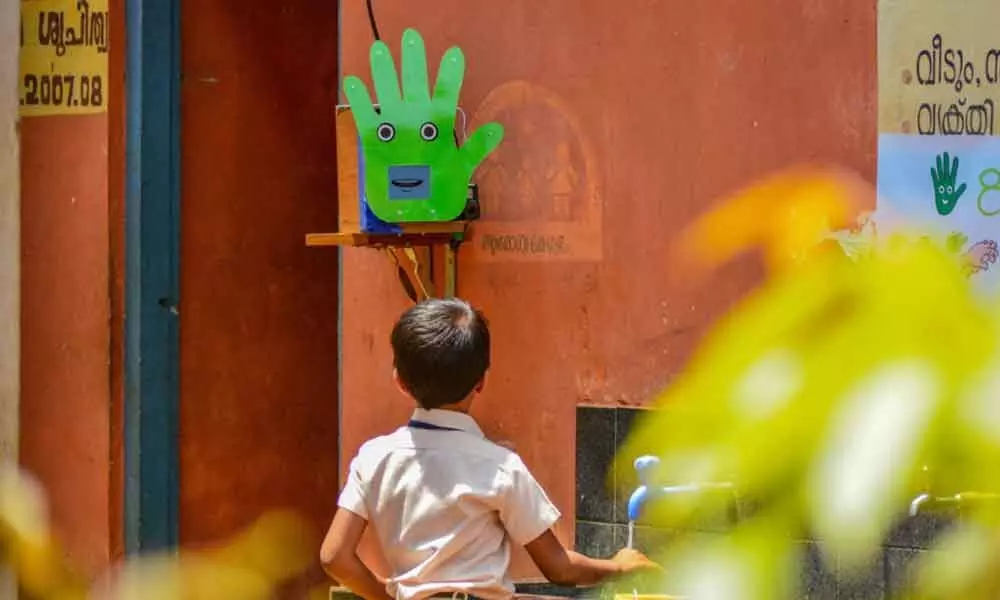Low-cost social robot teaches Kerala children hygiene lessons
 A student looks on at Pete, a hand-shaped speaking robot mounted on a wall near a handwashing station, at Chithragiri Government Primary School in Wayanad
A student looks on at Pete, a hand-shaped speaking robot mounted on a wall near a handwashing station, at Chithragiri Government Primary School in WayanadChildren at a primary school in a Kerala village have successfully learnt hygiene lessons and the importance of washing their hands effectively and consistently -- from their teachers of course but primarily from Pepe the robot.
New Delhi (PTI): Children at a primary school in a Kerala village have successfully learnt hygiene lessons and the importance of washing their hands effectively and consistently -- from their teachers of course but primarily from Pepe the robot. The novel, hand-shaped speaking robot has also taught the 100-odd SC and ST students of the Chithragiri Government Primary School in Wayanad how to wash their hands in accordance with WHO standards, researchers announced on Global Handwashing Day on Tuesday.
Pepe costs around Rs 7,000 and was developed by researchers from the University of Glasgow in Scotland in collaboration with the Amrita Vishwa Vidyapeetham University in Kerala. "We chose this particular school in Kerala because the schoolkids (between the ages of five and 10) are drawn from the Scheduled Castes and Tribes, a segment of the Indian population which is most affected by poor sanitation and hygiene," Amol Deshmukh, from the University of Glasgow, told PTI in an interview.
"This, we believe, is the first social robotics study to try to improve the lives of children like this," Deshmukh, who led the project in partnership with colleagues from Amrita University, added. Deshmukh and Amrita University's Unnikrishnan R presented Pepe -- introduced in the school in March this year -- at the 28th IEEE International Conference on Robot and Human Interactive Communication. Pepe is mounted on a wall above a handwashing station at the school. A small video screen mounted behind Pepe's green plastic exterior acts as a "mouth", allowing researchers to tele-operate the robot to speak to the pupils and draw their attention to a poster outlining the steps of effective handwashing. A set of moving "eyes" helps bolster the illusion that Pepe is paying attention to the children's' actions.
According to the researchers, the numbers illustrate the success of their experiment. The robot helped the children wash their hands more effectively and more consistently, boosting their rates of handwashing by 40 percent, the researchers said. The students also spent on average twice as long washing their hands after Pepe's arrival, they said. According to the team, over 95 percent of the students could correctly determine when handwashing with soap has to be done -- before a meal and after a visit to the toilet -- after the intervention.
The researchers noted that handwashing is one of the most effective defences against diarrhoea and respiratory infections, which cause the deaths of around 1,300 young children each day around the world -- 320 in India alone -- according to figures from WaterAid India and the World Health Organization (WHO). "We were delighted by the success of Pepe's visit to this primary school. None of the children had ever interacted with anything like a robot before, but they were excited to interact with this relatively simple machine, which clearly had a positive effect on their efforts to keep their hands clean," Deshmukh said. Unnikrishnan said social robots could potentially create a positive impact in our lives, but have rarely been tested with people from rural backgrounds in developing countries.
The Wayanad research, he said, will help in identifying a valuable and viable use case for social robots in rural populations in developing countries. In the future, researchers plan to develop autonomous technology for social robots so they are capable of interacting with children without any input from humans. "We're also keen to begin to carry out wide scale deployments in rural schools to measure effectiveness of this type of social robotics," Deshmukh added. The study also followed up with a questionnaire completed by 45 pupils who interacted with Pepe. The researchers are planning to expand on the pilot study and are looking forward to collaborating with both private and public sectors to upscale their prototype.
Last year, the team introduced a four-wheeled robot to help residents of Ayyampathy in Tamil Nadu to carry 20-litre bottles of water from the local well to their homes.














